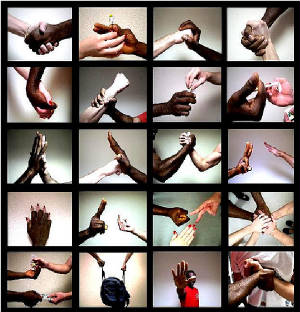|
|
 |
|
African American Culture, Injustices within Society
|
 |
|
|
|
| |
In the Quarter of the Negroes
Where the doors
are doors of paper
Dust of dingy atoms
Blows a scratchy sound.
Amorphous jack-o'-Lanterns caper
And the wind won't
wait for midnight
For fun to blow doors down.
By the river and the railroad
With fluid far-off goind
Boundaries
bind unbinding
A whirl of whisteles blowing.
No trains or steamboats going--
Yet Leontyne's unpacking.
In
the Quarter of the Negroes
Where the doorknob lets in Lieder
More than German ever bore,
Her yesterday past grandpa--
Not
of her own doing--
In a pot of collard greens
Is gently stewing.
Pushcarts fold and unfold
In a supermarket
sea.
And we better find out, mama,
Where is the colored laundromat
Since we move dup to Mount Vernon.
In the
pot begind the paper doors
on the old iron stove what's cooking?
What's smelling, Leontyne?
Lieder, lovely Lieder
And
a leaf of collard green.
Lovely Lieder, Leontyne.
You know, right at Christmas
They asked me if my blackness,
Would
it rub off?
I said, Ask your mama.
Dreams and nightmares!
Nightmares, dreams, oh!
Dreaming that the Negroes
Of
the South have taken over--
Voted all the Dixiecrats
Right out of power--
Comes the COLORED HOUR:
Martin Luther
King is Governor of Georgia,
Dr. Rufus Clement his Chief Adviser,
A. Philip Randolph the High Grand Worthy.
In white
pillared mansions
Sitting on their wide verandas,
Wealthy Negroes have white servants,
White sharecroppers work the
black plantations,
And colored children have white mammies:
Mammy Faubus
Mammy Eastland
Mammy Wallace
Dear,
dear darling old white mammies--
Sometimes even buried with our family.
Dear old
Mammy Faubus!
Culture,
they say, is a two-way street:
Hand me my mint julep, mammny.
Hurry up!
Make haste! | |
|
 |
|
|
|
 |
|
|
|
| |
Now dreams
Are not available
To the dreamers,
Nor
songs
To the singers.
In some lands
Dark night
And cold steel
Prevail
But the dream
Will come back,
And
the song
Break
Its jail.
|
|
| |
been scared and battered.
My hopes the wind done
scattered.
Snow has friz me,
Sun has baked me,
Looks like between 'em they done
Tried to make me
Stop
laughin', stop lovin', stop livin'--
But I don't care!
I'm still here!
|
|
| |
The night is beautiful,
So the faces of my people.
The
stars are beautiful,
So the eyes of my people.
Beautiful, also, is the sun.
Beautiful, also, are the souls of
my people.
|
|
| |
My old man's a white old man
And my old mother's
black.
If ever I cursed my white old man
I take my curses back.
If ever I cursed my black old mother
And wished
she were in hell,
I'm sorry for that evil wish
And now I wish her well
My old man died in a fine big house.
My
ma died in a shack.
I wonder were I'm going to die,
Being neither white nor black? | | | | | | | |

|
 |
|
|
|
|
|
I chose the above peoms to illustrate the main focus on much of Hugh's
work to be associated with the injustices of our American society along with his African American culture. "Cultural
Exchange" is about life in the black neighborhoods in comparison to those in the white neighborhoods. He makes
a point in saying "Culture, they say, is a two-way street." I think he is saying that with the culture of rich white
people comes the culture of poor black people who serve them, and all of these people live together. The poem entitled
"Oppression" is similar in nature. I think it is about how he feels that black people during his time don't even have
dreams anymore, because they have little chances to succeed in a country where their rights are not granted equally.
"Still Here" I believe is aimed at the oppressors. I think this poem was informing them that all the work they
have done to keep the black people down doesn't take away from the fact that they are still people and still surviving strong.
I think the poem "Cross" expands on that thought. The speaker of "Cross" has a white father and a black mother.
The person is neither completely black nor white, so he/she doesn't know where he fits in the world full of segregation.
The "cross" person in fact is half of each race, but he is living as one person.
 
|
|
|
 |

